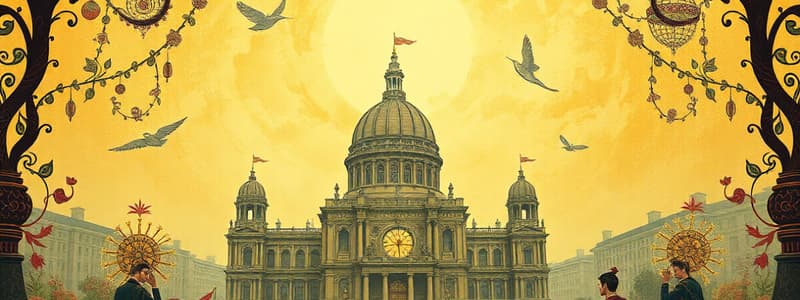Podcast
Questions and Answers
पॉलिटी का मूल तत्व कौन सा है जो राजनीतिक प्रणाली में शक्ति के वितरण और संचालन को दर्शाता है?
पॉलिटी का मूल तत्व कौन सा है जो राजनीतिक प्रणाली में शक्ति के वितरण और संचालन को दर्शाता है?
- राजनीतिक अभिनेता
- राजनीतिक संस्कृति
- शक्ति संरचना (correct)
- शासन प्रक्रियाएँ
किस प्रकार की पॉलिटी में लोग अपने चुने हुए प्रतिनिधियों के माध्यम से शक्ति का प्रयोग करते हैं?
किस प्रकार की पॉलिटी में लोग अपने चुने हुए प्रतिनिधियों के माध्यम से शक्ति का प्रयोग करते हैं?
- लोकतंत्र (correct)
- संविधानिक राजतंत्र
- धर्मतंत्र
- संकीर्णता
किस प्रणाली में एकाधिकार में धर्म के नेता सर्वोच्च सत्ता रखते हैं?
किस प्रणाली में एकाधिकार में धर्म के नेता सर्वोच्च सत्ता रखते हैं?
- अरस्तूत्व
- धर्मतंत्र (correct)
- तंत्र
- आधिकारिकता
राजनीतिक संस्कृति के तत्वों में निम्नलिखित में से क्या शामिल नहीं है?
राजनीतिक संस्कृति के तत्वों में निम्नलिखित में से क्या शामिल नहीं है?
राजनीतिक प्रणाली में निर्णय लेने की प्रक्रिया और सार्वजनिक नीति के कार्यान्वयन के लिए कौन सा तत्त्व जिम्मेदार है?
राजनीतिक प्रणाली में निर्णय लेने की प्रक्रिया और सार्वजनिक नीति के कार्यान्वयन के लिए कौन सा तत्त्व जिम्मेदार है?
किस प्रकार की पॉलिटी में राजशाही सर्वोच्च अधिकार रखती है?
किस प्रकार की पॉलिटी में राजशाही सर्वोच्च अधिकार रखती है?
किस प्रकार की पॉलिटी में शासन केवल एक छोटे समूह द्वारा किया जाता है?
किस प्रकार की पॉलिटी में शासन केवल एक छोटे समूह द्वारा किया जाता है?
किस प्रकार की पॉलिटी में सभी पहलुओं पर नियंत्रण के साथ एक केंद्रीकृत प्रणाली होती है?
किस प्रकार की पॉलिटी में सभी पहलुओं पर नियंत्रण के साथ एक केंद्रीकृत प्रणाली होती है?
Flashcards
Polity
Polity
राजनीतिक इकाई की शासन प्रणाली, संस्थाएँ और प्रक्रियाएँ।
लोकतंत्र
लोकतंत्र
एक ऐसा शासन प्रणाली जहां शक्ति लोगों के हाथ में होती है।
राजशाही
राजशाही
एक ऐसा शासन प्रणाली जहाँ राजा या रानी सर्वोच्च अधिकार रखता है।
अभिजात्यवाद
अभिजात्यवाद
Signup and view all the flashcards
अधिनियंत्रण
अधिनियंत्रण
Signup and view all the flashcards
राज्य का संविधान
राज्य का संविधान
Signup and view all the flashcards
राजनीतिक संस्कृति
राजनीतिक संस्कृति
Signup and view all the flashcards
राजनीतिक अभिनेता
राजनीतिक अभिनेता
Signup and view all the flashcards
Study Notes
Definition and Scope
- Polity refers to the structure and functions of a government, including its institutions, processes, and principles.
- It examines power distribution, authority relationships, and the allocation of roles within a society.
- Polity encompasses the government's organization and its interactions with citizens.
- This involves the legislative, executive, and judicial branches, their powers, and interactions.
- It studies the rules, constitutions, laws, and electoral mechanisms that manage political life.
- Polity helps understand how power is used and decisions are made within a given society.
Types of Polity
- Various forms of governance create different types of polity, including:
- Democracy: Popular rule, often through elected representatives.
- Monarchy: Rule by a monarch (king or queen).
- Aristocracy: Governance by a select, elite group.
- Oligarchy: Rule by a small, powerful group, frequently the wealthy.
- Totalitarian regimes: Highly centralized control over all facets of life, limited freedoms.
- Authoritarianism: Authority concentrated in a small group, but not necessarily total control.
- Theocracy: Religious leaders hold supreme authority.
Key Elements of Polity
- Power Structure: The arrangement and use of power within a political system, analyzing influential actors and their impacts on policies.
- Governance Processes: Mechanisms for decision-making and policy implementation at various levels (local, national, international), encompassing elections, laws, bureaucracy, and judicial review.
- Constitution and Laws: Formal and informal rules governing a polity, key for legitimacy, rights, and responsibilities.
- Political Culture: The prevalent values, beliefs, and norms shaping political behavior and attitudes.
- Political Actors: Individuals and groups involved in politics, including citizens, parties, interest groups, and government entities.
- Relationship between state and citizen: The interactions and responsibilities of the state towards its citizens, and vice versa.
- Sources of Political Conflict: Factors contributing to disagreements within a polity.
Interconnections with other Fields
- Political Science: The core academic discipline dedicated to the study of polity.
- Sociology: Examination of societal structures, institutions, and their influence on political behavior and decision-making.
- Economics: Analysis of resources, wealth distribution, economic policies, and their roles in shaping political systems and conflicts.
- History: Provides historical context for understanding the evolution of political systems and institutions.
Studying That Suits You
Use AI to generate personalized quizzes and flashcards to suit your learning preferences.




